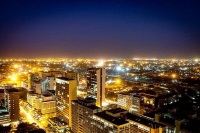
Nairobi is one of Africa's most fast-paced cities and the safari capital of Africa. It is a place of enormous energy, a tireless and thriving bustle of people, and a city of differences. Assorted races, tribes and origins are all a part of its make-up.
The city centre buzzes with the energy, aspirations and opportunism of moneychangers, safari touts, food vendors, trinket sellers, shoppers, and sharp-eyed shoe shiners assessing the footwear of the hurried throngs.
Kenyatta Avenue is the city's favourite tourist image, a broad avenue fringed by trees and flowers that was originally designed to allow a twelve-oxen team to make a full turn. There are several museums and places of interest in the centre, including the National Museum and Snake Park.
There are numerous markets selling traditional crafts, especially the popular Masai Market. Just outside of the centre is the Nairobi National Park, and the nearby Bomas of Kenya host performances of traditional dancing and singing. The Langata Giraffe Centre offers visitors the chance to hand-feed the Rothschild's giraffes that inhabit the area.
Safety has been a concern for tourists, as the capital has in recent years been the target of terrorist attacks. With safety in mind, travellers are advised to be vigilant when visiting the capital and keep an eye on official government warnings as to the latest safety information pertaining to Kenya. Yet despite these unfortunate few incidents, a trip to Nairobi is usually trouble free and tourists can still safely enjoy the beautiful flavour and culture of the vibrant and friendly city.

Travel Guide powered by Word Travels, copyright © 2023 Globe Media Ltd. By its very nature information in this travel guide is subject to change at short notice and travellers are urged to verify information on which they're relying with the relevant authorities. Neither Globe Media Ltd nor Travel Vogue can accept any responsibility for any loss or inconvenience to any person as a result of information contained above.